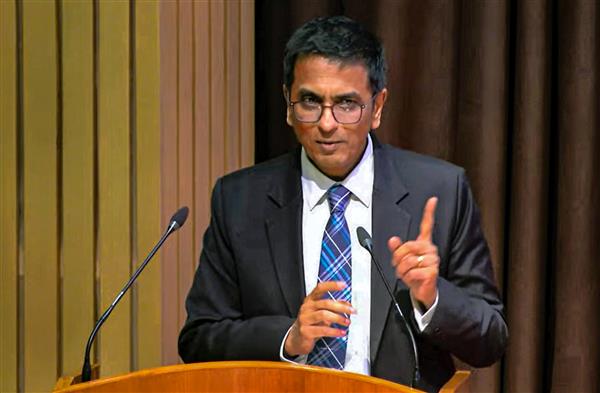
CJI DY Chandrachud- File photo
Satya Prakash
Tribune News Service
New Delhi, December 10
Noting that courts faced difficulties in dealing with “romantic cases” of sexual activities between consenting adolescents, Chief Justice of India DY Chandrachud on Saturday said Parliament must consider growing concerns regarding age of consent under POCSO Act which at present is 18 years.
“In my time as a judge, I have observed that this category of cases poses difficult questions for judges across the spectrum. There is a growing concern surrounding the issue which must be considered by the legislature in view of reliable research by experts in adolescent healthcare,” the CJI said in the presence of Union Minister for Women and Child Developments Smriti Irani, judges, lawyers and activists.
Delivering his keynote address at a two-day National Stakeholders Consultation on the Protection of Children from Sexual Offences (POCSO) Act organized by the Supreme Court Committee on Juvenile Justice in association with UNICEF, Justice Chandrachud, however, said, “I should leave this topic right here as this topic is very vexed as we see in courts every day.”
The POCSO Act criminalises all sexual acts among those under 18 regardless of whether consent is present factually among the minors, because the presumption of the law is that there is no consent among those below 18.
Irani highlighted that the average time taken to dispose of a POCSO case was 509 days while in the national capital the highest average case length in 2020 was 1284 days. Noting that for every conviction there were three acquittals and 56 per cent of all the cases were of penetrative sexual assault and 25.59 per cent aggravated sexual assault, she said the entire mechanism needed a robust intervention.
Describing sexual abuse of children as a “hidden problem” due to a “culture of silence” the CJI said “… the state must encourage families to report abuse even where the perpetrator is a family member.”
He said it was unfortunate that the criminal justice system functioned in a way that sometimes compounded the victims’ trauma and therefore, the Executive must join hands with the Judiciary to prevent it.
“The long-lasting implications of child sexual abuse make it imperative for the state and other stakeholders to create awareness regarding the prevention of child sexual abuse and its timely recognition and the remedy available in law,” the CJI said.
“Children must be taught the difference between safe touch and unsafe touch. While this was previously couched as good touch and bad touch, child rights activists have urged parents to use the word safe and unsafe because the word good and bad have moral implications and may prevent them from reporting the abuse,” he said, adding, “… there is an urgent need to ensure that the so-called honour of the family is not prioritised above the best interest of the child.”
The state must encourage the families to report abuse even when the perpetrator is a family member, he emphasised.
Noting that the families of victims were immensely hesitant to file a complaint with the police, the CJI cautioned against entrusting excessive powers to the police. “The slow pace of the criminal justice system is undoubtedly one of the reasons for this,” he added.
The CJI said judges must remember that children may not have the same vocabulary that adults do and may not discuss the details of the abuse in the same way as the adults do. “But this does not mean that they do not know what the perpetrator has done to them. Children of different ages may express themselves differently. But the essence of what they are communicating must be understood especially during cross-examination. Their contact with the criminal justice system must suit their needs as a vulnerable class of people,” the CJI said.
Join Whatsapp Channel of The Tribune for latest updates.



























